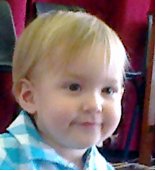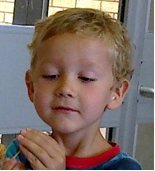Les and Sal Powrie Family Gazette
Christmas 2011
The family gathered for our 30th wedding anniversary. Going around the table: Leslie & Sally; Amy Schwartz (in pram), Mom (Margaret, also 80th birthday), Alison, Mark Burns; Cindy; Andrew H, Hannah, Shelly, Joshua Herbert; Andrew P; Ron & Pamela Powrie; Colleen & Rohan Schwartz; Richard.
Season’s greetings to all of our dear family and friends.
I’m writing this a little late this year, for which I apologize. It’s just been one of those Christmas seasons. We hope that you have been having a wonderful and blessed Christmas holiday season.
The year has been a busy one for the whole family. The family is happily growing and developing, as families are wont to do. We have a third grandchild, with a fourth on the way. Children are the greatest blessing imaginable, but this is one grandma who is perfectly happy to no longer be the one to be bearing them. Grandparenthood is the greatest – all the joy without the responsibility. There is nothing quite like tiny arms around your neck – but there’s also nothing quite like telling a miserable child that mommy or daddy wants them.
Les has been busy at work as usual. He was promoted to the position of a Deputy Director: Information Technology Advisory Services at SANBI, Kirstenbosch – but with nobody to really direct. He now has an intern working under him, but apart from that his work continues along the same lines as before. SANBI has some pretty strange ways of doing things. But if you get to work in a place akin to the Garden of Eden, who’s to complain? Apart from that, he continues with his usual clerk work at Church, at which he is always such a great example of conscientious service.
Shelly had her post at UCT (lecturer) made permanent, about which she is delighted. So she gets to carry on working in an office that has a wonderful view through lovely old trees, up the side of Devil’s Peak. She is the course convenor of Financial Reporting 2. (To me what that means is that she’s convenor of the second year accounting students.) There is now a text book published which has her name on it as one of the contributing authors – Financial Accounting: GAAP Principles (3rd Edition). In the midst of all this high-powered academic stuff, she still manages to be a very involved, caring mom. Especially exciting was the fact that she fell pregnant for the third time. The baby (a boy they are naming Caleb) is due in late February 2012. She’s had a lot of problems with a painful pelvis and pinched sciatic nerve, although those have been much improved by a chiropractor. She is a teacher in Relief Society (the women’s organisation at Church).
Andrew H has had an extremely busy year as bishop of Panorama ward at Church, as well as Branch Manager of Federal Clearing, where both he and Andrew P work. Having a lay ministry in our Church can certainly be arduous. But the spiritual rewards are great. He is proving to be a very caring and concerned bishop, as he goes about his work and service in his quiet way. He very obviously adores his wife and children, and would generally rather be with them than anywhere else.
Their children, Joshua and Hannah, are both growing in independence and confidence. Josh is 3½ and Hannah is 1½. Josh is at the Village Educare in Edgemead, next to Edgemead Primary School and he will stay there until it’s time to start Grade 1 at EPS, where uncles and aunts all went to school. Hannah is still with the day mother, Wendy, who periodically looked after our kids when they were little. When she is 2 she will also go to the same school as Josh. Caleb will then start with Wendy. Hannah is a real little “mommy”, and adores her baby cousin – any baby, in fact. Both kids love swimming this summer and are taking to it like little fish.
Colleen and Rohan had their first baby in May. The day after Hannah’s first birthday saw the arrival of little Amy Rose. Colleen had quite a difficult time with the natural delivery, and her recovery was long and slow. Amy suffered with colic for nearly 5 months, and I think her parents were wondering why on earth they had done this to themselves. But now at 7 months, she is a complete delight. She’s a real little pixie, and definitely takes after her daddy in looks.
Colleen went back to teaching at SACS after her maternity leave, and so has been having to battle the new challenge of being a working mom, with some very long hours (especially on days when she teaches A-level maths at the end of the day). Fortunately, teachers do get school holidays, so she can recover her sanity (what little any mom has) over this period and spend special time with her little one.
Rohan is still working for the same company up on Tygerberg Hill, which is conveniently close by. His contract position was made permanent at the beginning of the year, after his employers made him wait an inordinately long time to find out. So that was a relief for them both. He is serving as assistant Stake clerk, and he and Colleen are both in Primary (the children’s organisation at Church) – Rohan playing the piano, and Colleen as secretary, and leading the singing. Rohan decided to buy himself a second hand violin this year and is teaching himself to play it. Little Amy gets really excited when she hears it.
Andrew P’s biggest event this year was having laser surgery on his eyes at the beginning of the year, so that he no longer needs to wear glasses or contact lenses. This was something he had been wanting for a long time, and it has made a big difference to him. He moved house with his friends to the complex next door to the one in which they were living in Table View, when their lease ended. The house is a little bigger than the previous one and has a garage, which the other did not have. However the rooms are still tiny, as is the case with most of the new houses around here. He is still at Federal Clearing, having been there since he finished school in 2006 – 5 years already. I can’t believe how much time has passed. His favourite activities revolve around his X-Box, and he and his friends spend a lot of time on that. He still does a bit of extra work for Bryan Banfield, and some of his associates, related to the promotion of computer games. He went up to Johannesburg to Rage – a big computer game expo, where he was able to earn a bit of extra money from the work that he did.
Cindy has finished her 2nd year at UCT, with her subjects being Linguistics, Maths and English. She absolutely adores linguistics, enjoys English, and did not enjoy maths one little bit. However, she only needed to have one year of maths to be able to teach it at high school level, and in fact, did very well in it. Next year, she will go back to doing German again instead of maths. She has been exceptionally busy – I have no idea how she managed to do any varsity work, what with dancing and choir and a social life like I wished I could have had when I was a student. However, she did really well in all her subjects, especially linguistics. Dancing is the passion of her life now – she joined the Ballroom Dancing Society at varsity at the beginning of the year, and has progressed well. She took part in the Intervarsity competition and placed well. But, not only does she love ballroom and Latin, she and her dancing friends love to go and “sokkie” frequently at a place out in Brackenfell (the Afrikaans side of the “Boerewors Curtain”). She has continued singing in the UCT Singers choir – and even got to sing for Prince Charles. She decided she needed a new look this year, and cut her hair short – in a style that really suits her. She is as cat-mad as ever, and I got a bee in my bonnet that we needed to give her a kitten for her birthday. What on earth I could have been thinking, I have no idea. She called the kitten “Angel” – but “Demon” would have been more accurate. Anyway, she’s cute and gives us all lots of laughs. Cindy’s managed to get up to the temple 3 times this year, and has enjoyed the time in the temple and mixing with the Joburg Young Single Adults from Church.
Richard is 18! I can’t believe that my youngest is officially all grown up. And to add to that, he got his driver’s license 3 days before Christmas. So there can be no question as to whether or not we have any “children” anymore. The question is more – do we have any cars anymore? Grade 11 has been a really busy year for Richard. He has had his 4th year of being stage manager at school, for all the productions. He was elected to be a prefect, and these duties started in the third term, releasing the matrics from duty in order to focus on their exams. He had a great prefect camp at the beginning of his time in the role, where they had some wonderful activities, at a place called High Africa, out near Worcester. He’s worked really hard throughout the year, and placed in the top 10 in the grade. It’s only his Afrikaans that holds him back. He and I did a fair bit of extra Afrikaans together, to try and help with his vocabulary and sentence structure, but it’s still a challenge. He has two extra subjects – Advanced maths and IT (a more advanced course than is offered by the school as a standard subject). We were really proud when, after 6 years of hard work, he completed the requirements for the Duty to God program and was awarded the medallion before his 18th birthday. For those not in the Church, this would be the equivalent of Springbok scout in the scouting program.
Much to my (Sally’s) delight, I started tutoring at UCT medical school in the second semester. This has been something that I’ve been keen on for some time, but never managed to get the right spot. I have been working with 2nd year students, and this next year hope to be continuing, possibly with students from other years as well. I have been accepted to do a post graduate course in Health Professional Education in 2012. This is a one-year course, and I’m excited and nervous and wondering if I’m a little bit crazy to be doing this. But I really love being at medical school. The students are a pleasure – they’re so bright and stimulating. The course is being taught in a very different way from what I had when I was a student, and I find this new system – Supported Problem-Based Learning – extremely exciting. I have continued to do some writing, but not as much as before, although I have been commissioned to write a few health articles for a magazine.
Andrew and Shelly were very keen to get themselves a business, and happened to find a biltong shop for sale. They wanted us to go in with them, and David and Daphne van den Berg joined to bring in the butchery skills. The little shop is doing so-so, but perhaps its location doesn’t encourage a lot of passing trade. Anyway, it’s a learning experience for all involved. Although I have had very little to do with it, Les has been fairly involved on the maintenance, website, publicity and technology side.
One other major event in our year was our 30th wedding anniversary. We had a lovely dinner at our place for the family, granny flew down from Pretoria for this and we included a surprise birthday party for her 80th birthday for those members of the family who could not make it to Johannesburg for her big celebration in October.
I think that more or less covers our family’s major doings this year. We hope that you and yours are happy and well, and that you have a wonderful 2012.
All our love and blessings
Les, Sally
Shelly, Andrew, Joshua and Hannah
Colleen, Rohan and Amy
Andrew, Cindy and Richard
 Hannah, 18 months
Hannah, 18 months Our address etc.
Powrie family, 45 D’Urban Street,
Bothasig, 7441 South Africa
Phone: 021-558-4693
e-mail: sallypowrie@yahoo.co.uk



















